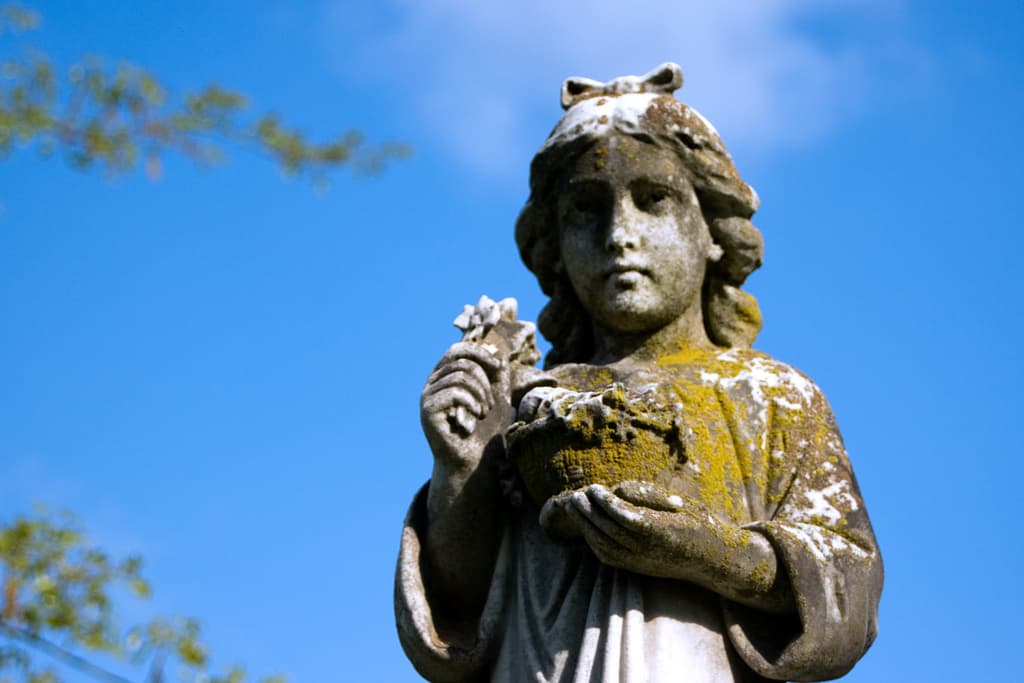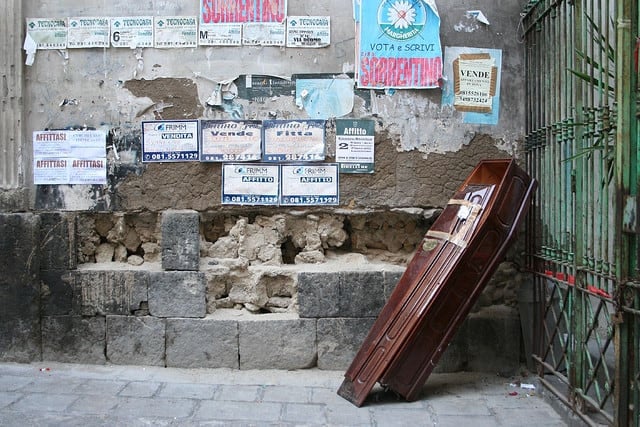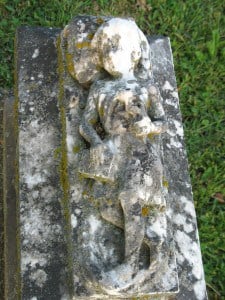He lived a great life, lived it well. Graduated high school early so he could enlist and fight in World War II. Was there at the Battle of the Bulge. Returned to Chicago and worked his way through night school to support his family. Got a job. Showed up. Laughed a lot. Worked hard. Had fun. Did well because, “hey, after the war, each day was a bonus.” Like so many of that great generation he went on to raise a wonderful (Irish Catholic) family. And, living into his 80’s, he got to see them live long lives too.
No one doubts God at funerals like those, and rightfully so – because they’re celebrations of life well lived.
***
I didn’t always think funerals could be beautiful. As a kid I hated funerals.
It seemed odd to me, willingly approaching a body wearing yellow-tan makeup, too-new rosary held in a stiff grasp. Their closed lips holding a stolid line, betraying neither smile nor frown. My curious young self would roll up on my toes to see if the chest was still moving.
And what if it was still moving. “Stop the wake!” I’d shout, my blazered arms flailing. “We’ve made a mistake! She’s just asleep, just resting doncha see?! We can’t bury her now!” I’d be a hero and folks would buy me rounds of kiddy cocktails at the reception until I couldn’t eat another maraschino cherry. I’d have a stomachache for days.
But they never woke up. They’d just lay there, all still and selfish. No cherries for me. No wonder everyone around me was crying.
***
A turning point came in the summer of ‘09. I was in the midst of seven weeks in a rural Jesuit mission in northeast India. Four hours of rutted mud roads lay between me and the nearest town of any size, and malaria was a fact of life, for both children and adults. When it broke out, the villagers would call on priests and sisters in addition to the doctors. One sick call sticks out.
Fr. Yanthan and I visited a child who was wheezing through the last days of life. Yan anointed the fevered body, softly patting his emaciated chest, rubbing in the holy oils. The quieted family sat off to the side, with distant dazed looks.
We sung a hymn in the local Garo language, which I could not speak. And Yan, who understood Garo, offered some few words of encouragement. After exchanging tight-lipped smiles with the family, Yan and I ducked out of the bamboo hut. Only a few seconds passed before the women flocked around the child’s litter, before the air filled with wailing, the universally understood sound of grief.
The sound rattled me and I kept glancing over my shoulder, looking at the house. Yan just kept trudging down the hill. I wanted to run back, calm them, say something, anything. But Yan just kept walking. “This will go on for hours,” he assured me, “come come.”
That night, I awoke to hear a doleful peal in the distance. The little boy had died. Someone from the family had run down the hill to the village church and sounded the bell. I said a prayer and tried to go back to sleep.
The next day, Fr. Yan and I returned to the bamboo hut. Inside we found a muslin blanket covering a tiny body that had been moving, wheezing, living, just hours before.
The weight of it settled on me. I was speechless.
Fr. Yan walked up, took the boy in his arms, and held the still body quietly.
***
Great things can be said at a funeral of those who have lived long, beautiful lives. No one doubts God at these funerals. There is less to say at the funeral of a child who has died of malaria. At least few that come to mind.
Still. Death has a way of pulling us out of ourselves, reminding us of the fragile vitality around us. The fears and annoyances of daily living – at least for a while – fade away. Our routines are not the center of attention, because our own well-being – at least for now – is not the center of our attention. We are drawn out of ourselves; our hearts and minds alight upon those who are gone, those who have lost.
***
By my lights, God – the God who rushes in the at the death of old and young alike – does not punish some with early death and reward others with long life. But when does God rush in? And where?
When platitudes fail. Where we no longer have a consoling word to speak. When we’ve just exchanged tight-lipped smiles as we parted the day before. When we don’t try so hard to tidy things up, to “celebrate life.” When life is too hard to celebrate. When we are vaguely angry with – dare it be said? – angry with God. Into that space of hurt and quiet incomprehension, into that cavern of doubt – this is where God rushes in.
God, in the wailing laments of a mother who has seen too much disease and death.
And God in those who surround her.
God, in shifting a child’s attention from kiddie cocktails to the odd reality of death before him.
And God in the witness of a veteran who, after all the death he had seen, counted every day a bonus.
God, in the awkward space when words fail and comprehension fails. Here, a figure steps in. And picks up a small body – and pulls it close.




